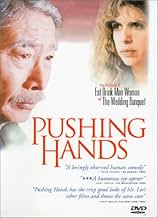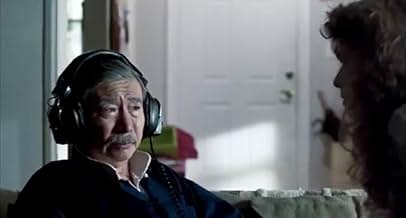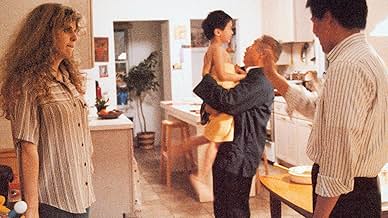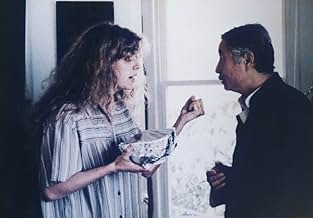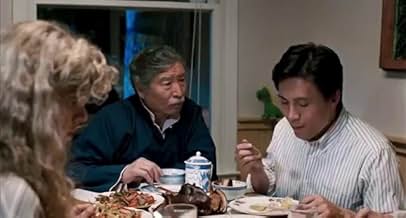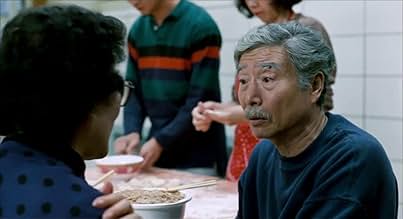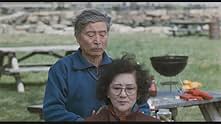CALIFICACIÓN DE IMDb
7.2/10
5.2 k
TU CALIFICACIÓN
Agrega una trama en tu idiomaAll the while, Master Chu tries to find his place in the foreign American world.All the while, Master Chu tries to find his place in the foreign American world.All the while, Master Chu tries to find his place in the foreign American world.
- Dirección
- Guionistas
- Elenco
- Premios
- 6 premios ganados y 7 nominaciones en total
Bozhao Wang
- Alex Chu
- (as Ye-tong Wang)
- Dirección
- Guionistas
- Todo el elenco y el equipo
- Producción, taquilla y más en IMDbPro
Opiniones destacadas
I do really love how when it comes to Ang Lee, there are no two films he's made that feel completely similar. He's up there with Spielberg when it comes to covering a wide variety of genres and tones, and maybe slightly more consistent, too. Pushing Hands was his debut, and while it reminded me a little of Eat Drink Man Woman in parts, it was still pretty different overall, in terms of its story and how it wasn't afraid to present a slightly heightened reality at times, too.
This does mean it's not as well balanced as Lee's 1994 film (and it doesn't hit as hard emotionally, either), but it does stand as a strong debut, and a film I mostly enjoyed quite a bit. It's a tiny bit rough around the edges, but only when you compare it to what Ang Lee was capable of doing just a few years later. Considering he was starting out here, it's a very confident and well-made debut.
Not all the humour hits, and some scenes end a bit abruptly. And as mentioned, the detours it almost takes into becoming a martial arts movie are unexpected (but will probably end up being one of the most memorable things about it). At its core though, it's a movie about family drama and the difficulties of growing old, and I think when it focuses on those things, it's quite effective. Lee's an empathetic filmmaker, and you always feel something for his main characters, and even in his debut, that's no exception.
While it's not one of his best films, I think it's still pretty easy to recommend and enjoy. I look forward to watching The Wedding Banquet soon, as I think that was his second film, and I've heard the general consensus is it's almost as good as the excellent Eat Drink Man Woman.
This does mean it's not as well balanced as Lee's 1994 film (and it doesn't hit as hard emotionally, either), but it does stand as a strong debut, and a film I mostly enjoyed quite a bit. It's a tiny bit rough around the edges, but only when you compare it to what Ang Lee was capable of doing just a few years later. Considering he was starting out here, it's a very confident and well-made debut.
Not all the humour hits, and some scenes end a bit abruptly. And as mentioned, the detours it almost takes into becoming a martial arts movie are unexpected (but will probably end up being one of the most memorable things about it). At its core though, it's a movie about family drama and the difficulties of growing old, and I think when it focuses on those things, it's quite effective. Lee's an empathetic filmmaker, and you always feel something for his main characters, and even in his debut, that's no exception.
While it's not one of his best films, I think it's still pretty easy to recommend and enjoy. I look forward to watching The Wedding Banquet soon, as I think that was his second film, and I've heard the general consensus is it's almost as good as the excellent Eat Drink Man Woman.
Tuei Sho(Pushing Hands) is Ang Lee's first film after graduation, and the first episode of his "Triad of Father." In spite of its status as an early work, it manifests subtlety, elegance and articulation in narration style constantly seen in his latter works. Everyone, whether seen this film or not, can tell that it's about the bondage and gap of affection, relation and interaction within family, but it's more than that. It also tells about culture, not only the apparent differentiation, but the shift within a man's life, the time and the whole modern history of China. If you understand Chinese(language, culture and history), it is delicately overwhelming. If not, it's still amiable and a bit exotic. Tuei Sho is so worth viewing and contemplating again and again.
The adage of "Great things come in small packages" aptly applies to PUSHING HANDS/TUI SHOU. The film deftly tells its story with charm, humor and grace. A son's elderly father is the newest part of the family, and troubles therein lie. Essentially, it's a story of one family, yet could easily fit into many households. So many topics are breached, under the gentle, loving eye of the director (Ang Lee). The leads, the venerable Sihung Lung, Deb Snyder and Bo Z. Wang, do a credible job bringing this story to life. Recommended.
10Matador
Pushing Hands is Ang Lee's beautiful film about an elderly Chinese man transplanted into his son's American home. While most films about this subject, which for some reason critics like to call "East meets West", hyperbolize the struggles that immigrant Chinese must face, Pushing Hands tends to focus on minutia instead. For example, the elderly grandfather does not know that tin foil cannot be put into the microwave, which leads to a scolding by his caucasian daughter-in-law. All the conflict in the film is grounded in the real world, as opposed to some very abstract 'generational conflict'. Because of this I found this film to be much more rewarding than most other films about Asian-Americans. A must-see for Chinese-Americans and Caucasians alike. Personally, I'd like to watch it with my Chinese grandparents.
Listen for James Schamus's cameo as the voice on the answering machine at the beginning of the film.
Listen for James Schamus's cameo as the voice on the answering machine at the beginning of the film.
Sihung Lung, the actor who played Master Chu, the aging tai chi master, gave a very convincing and sincere performance in this film. It was no wonder that he won the Golden Horse (Taiwan's equivalent for the Oscars) for Best Actor in this film. His performance was extremely touching, as tears jerked into my eyes as I see an aging and traditional Chinese father trying to get along with his westernized family while also trying to adjust to life in a new place and culture. The film encourages people, especially new immigrants, to emphasize and put themselves in their parents' shoes. Try to understand how difficult it is for them to come and settle in a new place and try not to push them away. Be patient with them, take a step back and everything may be better.
The movie title, "Pushing Hands", is very appropriate, as this is the term for an exercise in tai chi in which a person achieves balance by giving up balance. In this non-aggressive exercise between 2 people, a person offers no resistance at all to the pressure or push that the other person is exerting and keeps borrowing this strength until they feel they have fused into one and thus have achieved harmony. This was what Master Chu did. Although his daughter-in-law kept misunderstanding him, causing much discontent and eventually got his son to try to sent him away, he offered no resentment or a temper tantrum. He simply walked away gracefully. This action caused his son to appreciate him and remember why he got his father to live together in the first place in a tear jerking scene and finally they worked out a solution. They decided to give each other space by living separately instead of pushing each other away. In the end everyone was much happier, as even the daughter-in-law learned to accept the father, symbolized by her decorating the guest room for him and asking the question if he would ever visit. The father achieved the balance that he seek in Tai-Chi.
Ang Li is simply amazing and sensational. He did what he could with the limited budget and created a very warm and tear jerking film. Although this film was not the highest quality (the version I saw was very unclear and skips sometimes) and it could feel slow at times, especially the beginning sequence, the film was a great work in directing. The film picked up its pace after the slow beginning without any big fighting scenes or explosions and never felt boring afterwards. Also, from the beginning sequence, where he was able to show the dissension and gap between the daughter-in-law and the father by using just different scenes and visuals, to scenes throughout the film where he used lighting and different camera angles to show the internal pain and sadness that the father experience, it was, simply put, a great piece of art considering the budget. It showcased the talent of Li and gave the audience a glimpse of the man who would bring us the memorable Couching Tiger, Hidden Dragon.
The movie title, "Pushing Hands", is very appropriate, as this is the term for an exercise in tai chi in which a person achieves balance by giving up balance. In this non-aggressive exercise between 2 people, a person offers no resistance at all to the pressure or push that the other person is exerting and keeps borrowing this strength until they feel they have fused into one and thus have achieved harmony. This was what Master Chu did. Although his daughter-in-law kept misunderstanding him, causing much discontent and eventually got his son to try to sent him away, he offered no resentment or a temper tantrum. He simply walked away gracefully. This action caused his son to appreciate him and remember why he got his father to live together in the first place in a tear jerking scene and finally they worked out a solution. They decided to give each other space by living separately instead of pushing each other away. In the end everyone was much happier, as even the daughter-in-law learned to accept the father, symbolized by her decorating the guest room for him and asking the question if he would ever visit. The father achieved the balance that he seek in Tai-Chi.
Ang Li is simply amazing and sensational. He did what he could with the limited budget and created a very warm and tear jerking film. Although this film was not the highest quality (the version I saw was very unclear and skips sometimes) and it could feel slow at times, especially the beginning sequence, the film was a great work in directing. The film picked up its pace after the slow beginning without any big fighting scenes or explosions and never felt boring afterwards. Also, from the beginning sequence, where he was able to show the dissension and gap between the daughter-in-law and the father by using just different scenes and visuals, to scenes throughout the film where he used lighting and different camera angles to show the internal pain and sadness that the father experience, it was, simply put, a great piece of art considering the budget. It showcased the talent of Li and gave the audience a glimpse of the man who would bring us the memorable Couching Tiger, Hidden Dragon.
¿Sabías que…?
- ErroresThe son, Alex, has physiognomy that is unmistakably that of someone Beijing, and the actor speaks with a Beijing accent, but the father, who demonstrates Taiwanese cultural practices, has the appearance of someone from farther south, such as near Shanghai. Regardless of whom the father might have married, the couple could not have produced a child with such Northern characteristics. This is a casting error more than a character error.
- ConexionesFeatured in Century of Cinema: Naamsaang-neuiseung (1996)
Selecciones populares
Inicia sesión para calificar y agrega a la lista de videos para obtener recomendaciones personalizadas
- How long is Pushing Hands?Con tecnología de Alexa
Detalles
- Fecha de lanzamiento
- Países de origen
- Idiomas
- También se conoce como
- Pushing Hands
- Locaciones de filmación
- Productoras
- Ver más créditos de la compañía en IMDbPro
Taquilla
- Presupuesto
- USD 400,000 (estimado)
- Total en EE. UU. y Canadá
- USD 152,322
- Fin de semana de estreno en EE. UU. y Canadá
- USD 9,567
- 4 jun 1995
- Total a nivel mundial
- USD 152,322
Contribuir a esta página
Sugiere una edición o agrega el contenido que falta


